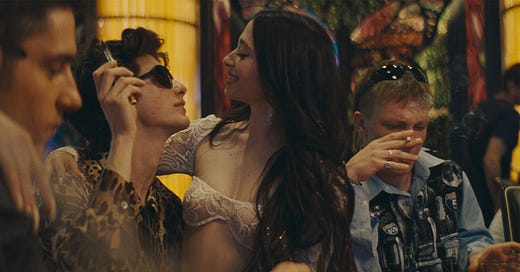Is "Anora" Uncritical or Disinterested?
Sean Baker's vérité-style Palme d'Or winner is intimate yet distant
Sean Baker has always used distance for the sake of intimacy. His brand of narrative vérité is characteristically non-judgmental — the camera as a wandering eye that lends its gaze to those not usually granted the power to dictate their own image, or even to exist within its line of sight. But this calculated distance is limited in what it can capture. Baker may be concerned with the material circumstances of America’s disenfranchised, but he never identifies an arbiter of these realities, lending him the ability to play as a political middle-man — a role that he loves.
But Anora is an exception. The premise is in tune with all of Baker’s classic tendencies — Ani (Mikey Madison), a sex worker from Brooklyn, elopes with Ivan (Mark Eydelshteyn), the son of a Russian oligarch, setting off his family and sparking a legal (and physical) brawl — but Baker discards his characteristic political pliability and identifies a tangible, structural villain.
Initially, the tension lies between the newlyweds and Ivan’s absurdly wealthy family, who see the marriage as a vicious blow to their international optics. But once they send out a horde of henchman to talk sense into Ivan, the triangulation of the dynamic shifts, and the film takes a slow turn to show that Ani has far more in common with the other countless employees sent to do Ivan’s family’s dirty work than she ever will with Ivan himself.
The scope of Anora shifts, turning from a roller-coaster ride of a singular circumstance into an exercise in cathartic class solidarity. The excess of Ivan’s life is exhilarating, but the lavishness tarnishes into something bland and bleak. The superfluity becomes dismal and noisy, no longer representative of a newfound freedom but rather a nauseating ability to exercise absolute power.
Within this dreary opulence, the camera often stands at a distance, using low wide angles that ask for tentative permission to observe, undercutting any voyeuristic tendencies that are invited by its presence. This radical lack of judgment renders Anora as a vehicle for a great performance, and Mikey Madison certainly delivers, articulating her character as fiery and endlessly textured, never reducing her to naivete or delusion as she becomes further entangled in her whirlwind relationship with Ivan.
But Madison’s stunning performance cannot fully distract from the fact that it sometimes feels like she’s fighting an uphill battle against the film’s desires to use her as a vehicle for a reflexive macro about our social sympathies. Baker’s characteristic lack of judgment occasionally deprioritizes her interiority and paints her as blankly representative by intentionally never pursuing curiosity about her character.
Anora then begs a crucial question: is an anti-critical gaze enough? By closing off its main character to emphasize our lack of entitlement to her, is she then only defined by what she exists in proximity to? Is Baker’s distance polite or disinterested?
Anora’s circumvention of its main character mostly seems to serve its final scene, in which the false shallowness of her internal self suddenly gives way and we are presented with a gutting catharsis. But the distance the film maintains until this moment shows Baker’s lack of faith in his own ability to create emotion except when following an extended period of intentionally withholding it. Comprehensive and developed emotion should not be restrained simply for the sake of catharsis, and Baker’s instinct to do so leaves his titular character incomplete.
This dilemma does not dissolve the rest of Anora’s power, but it does reveal an unfortunate shortcoming in Baker’s style — to him, political clarity and character depth are mutually exclusive. In order to delve into authentic emotion, Baker maintains political abstinence; but if he wants to consider something broader or structural, it comes at the expense of his characters being treated as little more than vessels in this exercise. This false dichotomy does not ruin Anora, but it inhabits the core of it, preventing the film from ascending to something greater.
OVERALL SCORE: 8/10
Anora was released on October 18 and is currently showing in US theaters.





I would say 9/10 myself :) but I am brand new to sean baker, having just seen (and been transfixed by) the Florida Project just a couple days before seeing Anora.
הושיעני